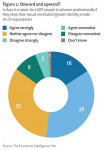Agricultural commodity prices will stagnate this year,according to Economist Intelligence Unit
Agricultural commodity prices soared in 2007 and early 2008 largely because of strong growth in demand, particularly from developing countries (where disposable incomes were rising) and from the biofuel industry. Investors increasingly sought exposure to the sector, especially through the futures markets. As signs of the global financial crisis emerged, however, money flowed out of agricultural markets. Trade was constrained by increasing difficulty in obtaining letters of credit, while the prospect of widespread recession started to feed through to weaker global demand. Falling oil prices compounded the sector's problems by making the use of agriculture-based biofuels less price competitive. These negative developments coincided with record harvests, particularly of grains and some oilseeds, which boosted supply and exacerbated the downward trend in prices.
Grains prices are expected to recover from recent lows over the course of this year as it becomes increasingly clear that official policies are going to remain supportive of biofuel development, notwithstanding lower hydrocarbon prices. By 2010 smaller harvests (2008 was a bumper year) and lower yields owing to less investment by cash-strapped farmers, coupled with already low stocks, will combine to see prices move higher. The oilseed sector will also suffer from lower investment in 2009 but higher production in 2010/11 will more than meet demand resulting in little upward pressure on prices.
The beverages price index is expected to fall throughout the forecast period as the coffee, tea and cocoa markets will be in healthy surpluses and demand growth will be subdued. The price of sugar rose by 27% in 2008, but has not subsequently collapsed and we expect sugar prices to continue to rise over the forecast period. The market is currently in deficit and demand from the ethanol sector is expected to support the price.
For specific commodities, the Economist Intelligence Units current forecasts are as follows:
Overview:Generally good supply prospects and weaker demand underpin our forecast of relatively little recovery in the prices of agricultural commodities in 2009. Furthermore, we expect prices broadly to stabilise at these lower levels in 2010 as weak global economic conditions persist. However, global stocks are at historically low levels and any unforeseen disruptions to supply of individual commodities could therefore send prices higher.
Cocoa:The cocoa market will return to surplus in 2009/10. This, together with weaker demand for chocolate confectionery, particularly in the developing world, suggests that prices will fall.
Coffee:Coffee prices are expected to fall in both 2009 and 2010 as the market remains in surplus. In 2008/09 the impact of a poor Brazilian harvest will be more than offset by weaker demand.
Grains:An expected surplus in the market, together with stagnating demand, will mean that there will be little upward pressure on wheat prices in 2009. The maize market is expected to be in deficit in 2009/10, which will support prices but will also encourage planting and a return to a market surplus in 2010/11. Rice prices will stabilise at around currently traded levels during 2009, before resuming an upward trend as a result of tightening world stocks. Sorghum will benefit from demand from the biofuels sector in the US in particular and prices will rise over the forecast period.
Oilseeds:By the end of 2008 prices of all vegetable oils had plummeted. There has been some recovery in early 2009, owing to concerns about the likely size of South American crops, particularly of soybean and sunflowerseed. Palm oil is likely to suffer from a persistent build-up of stocks during 2008/09 and 2009/10. Stocks of rapeseed and rapeseed oil are also on the increase.
Sugar:Sugar prices are expected to rise moderately over the forecast period, largely owing to sustained demand from the biofuels sector and from self-sufficient and surplus-producing countries. These countries account for a large share of growth in sugar consumption.
Tea:The upward pressure on prices in 2008 as a result of tighter global supply is set to reverse in 2009-10, as production increases in all the major producers. Growth in consumption is expected to remain relatively robust as tea remains a cheaper alternative to its main competitor, coffee.
World commodity forecasts: food, feedstuffs and beverages February 2009
Notes for editors
World commodity forecastsis published quarterly in two volumes, providing expert analysis and forecasts on 28 commodities. One volume, Food, feedstuffs and beverages, covers the four key soft commodity groups: beverages, grains, oilseeds and sugar. A second volume, Industrial raw materials, analyses the four key hard commodity groups: base metals, natural fibres, rubber and crude oil.
About the Economist Intelligence Unit
The Economist Intelligence Unit is the business information arm of The Economist Group, publisher ofThe Economist. Through our global network of more than 700 analysts and contributors, we continuously assess and forecast political, economic and business conditions in 200 countries. As the world's leading provider of country intelligence, we help executives make better business decisions by providing timely, reliable and impartial analysis on worldwide market trends and business strategies.
웹사이트: http://www.eiu.com
연락처
Joanne McKenna
Press Liaison
Economist Intelligence Unit
26 Red Lion Square
London
WC1R 4HQ
UK
Direct: +44 (0) 20 7576 8188
Sales: +44 (0) 20 7576 8181
Switchboard: +44 (0) 20 7576 8000
email: 이메일 보내기
이 보도자료는 Economist Intelligence Unit가(이) 작성해 뉴스와이어 서비스를 통해 배포한 뉴스입니다. 뉴스와이어는 편집 가이드라인을 준수합니다.




